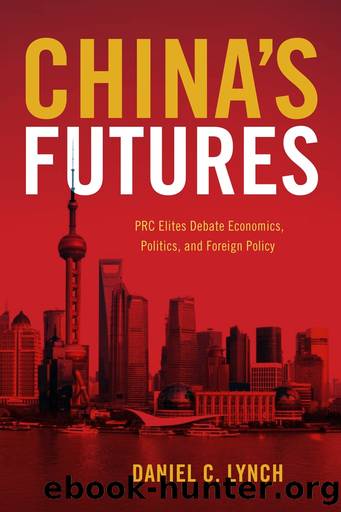China's Futures: PRC Elites Debate Economics, Politics, and Foreign Policy by Daniel C. Lynch

Author:Daniel C. Lynch [Lynch, Daniel C.]
Language: eng
Format: epub
Tags: Political Science, General
ISBN: 9780804794374
Google: F_91BgAAQBAJ
Goodreads: 23508124
Publisher: Stanford University Press
Published: 2015-03-11T00:00:00+00:00
CHAPTER 6
Competing with the West on the âCultural Frontâ in International Relations*
PROBABLY THE CENTRAL QUESTION OF CONCERN to analysts and policy makers who study Chinaâs trajectory is whether the PRCâs national rise will be peaceful, given the logic of power transitions.1 Would a transfer of global preeminence from the United States to China more closely resemble the processes that led to the peaceful handoff from Great Britain to the United States after World War I or the violent rises of Germany and Japan in the first half of the twentieth century?
One key factor determining whether a transition will be peaceful is the relative satisfaction of the rising power with the international status quo and overall course of the transition.2 The presumption of this chapter is that if a rising powerâs (and certainly Chinaâs) foreign policy elites perceive culture on the international levelâthe globally prevalent pattern of values, beliefs, norms, and symbolic structuresâas a zone of cooperation with the dominant state and its allies, rather than a zone of contestation, the rising power will probably be satisfied, and the transition is more likely to be peaceful. Countries in the dominant coalition will have played a central role in forming the global cultural order. This was certainly true for the United States in the twentieth century. Whether the issue is Washingtonâs role as chief architect of the system-defining international regimes put in place in the years following World War II or Hollywoodâs (and, more recently, Silicon Valleyâs) dominant position in shaping global popular culture and the architecture of the worldwide network society, the United States and its allies have indisputably been central to creating the âideational orderâ into which China began rising in the 1990s. If Chinese elites now perceive this side of international relations to be benign or helpful for Chinaâs rise, the rise is more likely to be peaceful and free of large-scale conflict.
If, on the other hand, Chinese elites perceive globally prevalent culture in adversarial or conflictual terms, there is heightened reason to be concerned that the transition will turn violent. Probably nothing is more productive of conflict when securitized than culture. Consider a politically authoritative Chinese definition of the concept:
Culture is the real, lived experiences and feelings in peopleâs internal life-worlds; their thinking patterns, value standards, and emotional tendencies; it manifests itself in human activities and the material objects they create . . . [Culture] indicates peopleâs thoughts and rational concepts, their knowledge and technical capacities, morality and beliefs, arts and imagination. Society is a living organism; . . . culture is the brain, the soul . . . We [Communist Party elites] must âconstruct the brain.â3
CCP elites might decide that opening China to relatively unfettered flows of culture from abroad would be useful for strengthening the country. The PRC has already come a strikingly long way in this direction since the days of Mao Zedong. The Party evidently values Chinaâs deep enmeshment in the global economy (although there is the counterforce of economic nationalism). Its leaders might adopt a similar attitude and similar policies toward global cultural flows.
Download
This site does not store any files on its server. We only index and link to content provided by other sites. Please contact the content providers to delete copyright contents if any and email us, we'll remove relevant links or contents immediately.
What's Done in Darkness by Kayla Perrin(26619)
The Fifty Shades Trilogy & Grey by E L James(19100)
Shot Through the Heart: DI Grace Fisher 2 by Isabelle Grey(19083)
Shot Through the Heart by Mercy Celeste(18955)
Wolf & Parchment: New Theory Spice & Wolf, Vol. 10 by Isuna Hasekura and Jyuu Ayakura(17139)
Python GUI Applications using PyQt5 : The hands-on guide to build apps with Python by Verdugo Leire(17026)
Peren F. Statistics for Business and Economics...Essential Formulas 3ed 2025 by Unknown(16900)
Wolf & Parchment: New Theory Spice & Wolf, Vol. 03 by Isuna Hasekura and Jyuu Ayakura & Jyuu Ayakura(16841)
Wolf & Parchment: New Theory Spice & Wolf, Vol. 01 by Isuna Hasekura and Jyuu Ayakura & Jyuu Ayakura(16470)
The Subtle Art of Not Giving a F*ck by Mark Manson(14385)
The 3rd Cycle of the Betrayed Series Collection: Extremely Controversial Historical Thrillers (Betrayed Series Boxed set) by McCray Carolyn(14158)
Stepbrother Stories 2 - 21 Taboo Story Collection (Brother Sister Stepbrother Stepsister Taboo Pseudo Incest Family Virgin Creampie Pregnant Forced Pregnancy Breeding) by Roxi Harding(13678)
Scorched Earth by Nick Kyme(12788)
Drei Generationen auf dem Jakobsweg by Stein Pia(10984)
Suna by Ziefle Pia(10903)
The Ultimate Python Exercise Book: 700 Practical Exercises for Beginners with Quiz Questions by Copy(10592)
D:\Jan\FTP\HOL\Work\Alien Breed - Tower Assault CD32 Alien Breed II - The Horror Continues Manual 1.jpg by PDFCreator(10563)
De Souza H. Master the Age of Artificial Intelligences. The Basic Guide...2024 by Unknown(10540)
Scythe by Neal Shusterman(10370)
